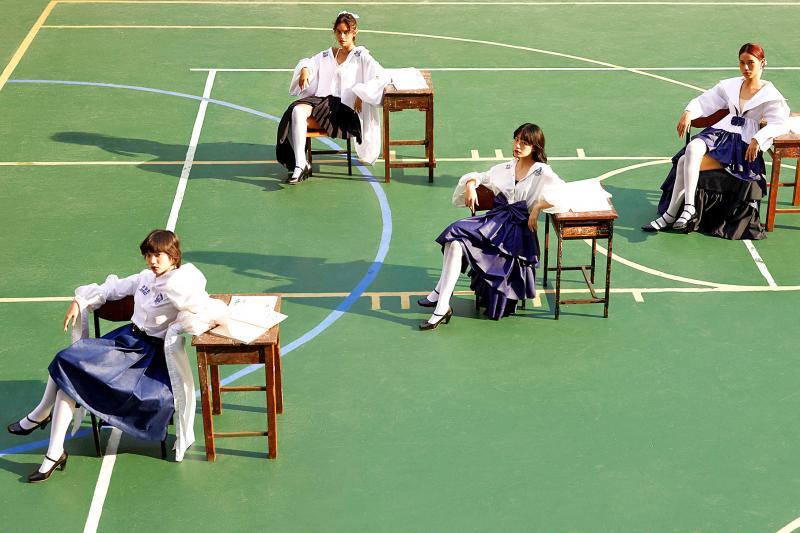In Thai classrooms, showing a rebellious or creative streak through what you wear is difficult.
School uniform rules are strict, down to how pupils’ hair should be cut, and the type of socks and shoes they are allowed to wear.
However, as students around the country push back against what they call archaic rules and join a broader pro-democracy movement, a young clothing designer is throwing his support behind them in a colorful way.

Photo: Reuters
Tin Tunsopon has taken the typical uniform of pleated skirts and white sailor shirts for girls, and neat shorts and white shirts for boys, and blown them up into exaggerated versions with huge collars and sleeve ruffles made from shoe laces.
“By recreating these uniforms and giving them various designs ... people can see that we should no longer be attached to the [traditional] uniforms anymore,” 23-year-old Tin said.
The clothing line labeled the “rule breakers” was launched in collaboration with the Wacoal lingerie brand in June, with prices ranging from US$100 to a top end of US$475, for a long pleated skirt with a big bow.
Tin said they are designed for “modern day girls, who are not afraid to express themselves and move with confidence.”
“The uniforms break away from the traditional forms, although still resembles a uniform... I want to support kids to be as creative as they can,” Tin said.
Tin has named his label “Post-Thesis,” a nod to his graduation project at Bangkok University, where he examined the purpose of uniforms and how they can be changed.
The rebellious movement sweeping through Thai high schools has been dubbed “Bad Student” by its leaders. Students have worn white ribbons, publicly hacked off their hair and made Hunger Games salutes in a bid to shake up the nation’s rigid education system.

With much pomp and circumstance, Cairo is today to inaugurate the long-awaited Grand Egyptian Museum (GEM), widely presented as the crowning jewel on authorities’ efforts to overhaul the country’s vital tourism industry. With a panoramic view of the Giza pyramids plateau, the museum houses thousands of artifacts spanning more than 5,000 years of Egyptian antiquity at a whopping cost of more than US$1 billion. More than two decades in the making, the ultra-modern museum anticipates 5 million visitors annually, with never-before-seen relics on display. In the run-up to the grand opening, Egyptian media and official statements have hailed the “historic moment,” describing the

‘CHILD PORNOGRAPHY’: The doll on Shein’s Web site measure about 80cm in height, and it was holding a teddy bear in a photo published by a daily newspaper France’s anti-fraud unit on Saturday said it had reported Asian e-commerce giant Shein (希音) for selling what it described as “sex dolls with a childlike appearance.” The French Directorate General for Competition, Consumer Affairs and Fraud Control (DGCCRF) said in a statement that the “description and categorization” of the items on Shein’s Web site “make it difficult to doubt the child pornography nature of the content.” Shortly after the statement, Shein announced that the dolls in question had been withdrawn from its platform and that it had launched an internal inquiry. On its Web site, Le Parisien daily published a

UNCERTAIN TOLLS: Images on social media showed small protests that escalated, with reports of police shooting live rounds as polling stations were targeted Tanzania yesterday was on lockdown with a communications blackout, a day after elections turned into violent chaos with unconfirmed reports of many dead. Tanzanian President Samia Suluhu Hassan had sought to solidify her position and silence criticism within her party in the virtually uncontested polls, with the main challengers either jailed or disqualified. In the run-up, rights groups condemned a “wave of terror” in the east African nation, which has seen a string of high-profile abductions that ramped up in the final days. A heavy security presence on Wednesday failed to deter hundreds protesting in economic hub Dar es Salaam and elsewhere, some

Flooding in Vietnam has killed at least 10 people this week as the water level of a major river near tourist landmarks reached a 60-year high, authorities said yesterday. Vietnam’s coastal provinces, home to UNESCO world heritage site Hoi An ancient town, have been pummeled by heavy rain since the weekend, with a record of up to 1.7m falling over 24 hours. At least 10 people have been killed, while eight others are missing, the Vietnamese Ministry of Natural Resources and Environment said. More than 128,000 houses in five central provinces have been inundated, with water 3m deep in some areas. People waded through